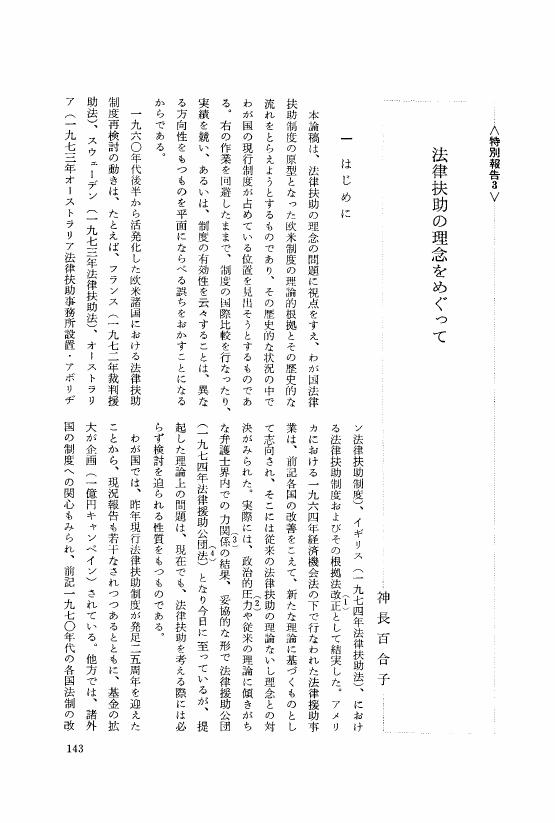フェミニズムを「現代市民社会論」の一環としてとらえ直すことを通じて、女性や家族をめぐる様々な問題を検討し、同時にポスト近代における新たな政治のあり方について研究を進めた。具体的には、以下の三つの観点から共同研究およびそれらの統合を行った。<1 基礎的研究>昨年度に続き、法学・政治学・現代正義論・政治思想史・法思想史・文学の各分野において,女性がどのように位置づけられてきたかを検討した。そこでは、多くの分野において女性をめぐる様々な問題が充分に検討されずに、理論的にも死角となってきていたことが明らかになった。この死角を埋めるべく、市民論・権利論などの視角から、女性や家族をめぐる問題を法や政治に取り込むためことを目指して研究を進めた。その過程で、女性や家族をめぐる諸問題は、それ自体として検討することは言うまでもなく、国際化と多文化主義の流れのなかで他のマイノリティーがかかえる問題とも関連させた上で、理論化すべきであることが強く意識されるに至った。<2 応用的研究>女性の政治参加のあり方・社会保障制度における女性の位置・差別と女性の問題・韓国の婚姻制度における諸問題・多文化主義と国家の中立性などの観点から、具体的な問題をとりあげ、既存の制度がかかえる問題点を明らかにするとともに、現代により相応しい制度のあり方の設計をも射程に入れた研究を行った。その過程で、個別の制度の検討・評価だけではなく、国際比較や比較法的研究や、例えば社会保障制度と民事的な扶養責任の関係などこれまで別の領域と見なされてきた問題・制度の間での比較・検討など、より多角的な研究が必要であることが痛感された。<3 研究の統合>今年度は,助成額が少額であったため、札幌・東京・名古屋を相互に訪問するなどの研究交流や、研究代表者・研究分担者が一堂に会しての研究会等は行えなかった。従って、情報の交換・各自の研究の統合は専らインターネット等を介してのものとなった。
1 0 0 0 OA 法律扶助の理念をめぐって
- 著者
- 神長 百合子
- 出版者
- 日本法社会学会/有斐閣
- 雑誌
- 法社会学 (ISSN:04376161)
- 巻号頁・発行日
- vol.1978, no.30, pp.143-152, 1978-03-30 (Released:2009-01-15)
- 参考文献数
- 33
- 著者
- 神長 百合子
- 出版者
- The Japanese Association of Sociology of Law
- 雑誌
- 法社会学 (ISSN:04376161)
- 巻号頁・発行日
- vol.2004, no.61, pp.147-165,218, 2004
This paper presents an analysis on the professional work and consciousness of the Japanese women lawyers who practice law in the metropolitan area of Tokyo. It is based on the research of women lawyers conducted in 1998 supported by Grant-in-Aid for Scientific Research of the Japan Society for the Promotion of Science.<br>The frame of the research is to see if the international trend of the female bar to commit to the women's cause, especially "Women's Rights, " or feminist perspectives has any effect on Japanese legal practice by women lawyers. My former research of 1991 (cf. Kaminaga & Westhoff, "Women Lawyers in Japan: Contradictory Factors in Status, " in Shultz & Shaw eds. Women in The World's Legal Profession, 2003) suggested that women lawyers held a very special position in Japanese society-a kind of limbo between the general low social status of Japanese women and the very elevated status of the elite profession of law. Following up this result in a larger scale with more sophisticated design, I conclude that the same picture still applied to Japanese women lawyers at the turn of the century. The status factors reflected in their everyday practice and their attitude toward the representation of women clients and the "Women's Rights" cause.
